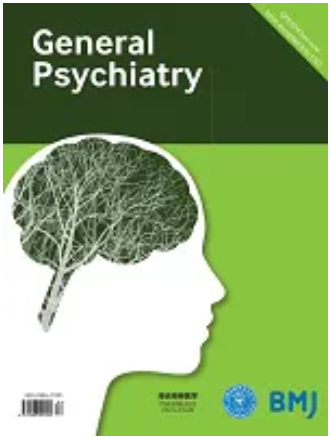基于虚拟现实的认知行为疗法治疗急性心肌梗死患者的焦虑症:随机临床试验
IF 5.3
3区 医学
Q1 PSYCHIATRY
引用次数: 0
摘要
背景 急性心肌梗死(AMI)患者普遍存在心理健康问题,严重影响了他们的康复。利用基于虚拟现实的认知行为疗法(VR-CBT)提供及时、方便的心理干预,有可能改善影响患者心理健康的急性和长期症状。目的 我们旨在研究虚拟现实认知行为疗法对急性期入住重症监护室(ICU)的急性心肌梗塞患者焦虑症状的疗效。方法 在这项单盲随机临床试验中,我们在 2022 年 12 月至 2023 年 2 月期间连续招募了因急性心肌梗死而入住重症监护室的有焦虑症状的参与者。年龄在18-75岁之间的汉族患者通过整群随机分配(1:1)被随机分配到VR-CBT组,在接受标准心理健康支持的同时接受VR-CBT治疗;或被随机分配到对照组,仅接受标准心理健康支持。VR-CBT 包括四个模块,在床边进行,为期一周。评估分别在基线、治疗后即刻和 3 个月随访时进行。意向治疗分析始于 2023 年 6 月。主要结果指标是通过汉密尔顿焦虑评定量表(HAM-A)评估焦虑症状的变化。结果 在 148 名随机参与者中,70 人被分配到 VR-CBT 组,78 人被分配到对照组。与单纯的标准心理健康支持相比,为期一周的 VR-CBT 干预和标准心理健康支持在干预后的 HAM-A 评分上都能显著减轻焦虑症状(Cohen's d=-1.27 (95% 置信区间 (CI):-1.64 至 -0.90):-1.64至-0.90,p<0.001)和3个月的随访(Cohen's d=-0.37(95% 置信区间:-0.72至-0.01,p=0.024)。在接受 VR-CBT 的 70 名参与者中,62 人(88.6%)完成了整个干预过程。报告的主要不良事件为晕机(5 人)。结论 我们的研究结果表明,VR-CBT 可以显著减轻急性期急性心肌梗死后的焦虑;这种改善在 3 个月的随访中得以保持。试验注册号 试验注册于[www.chictr.org.cn][1],标识符为:ChiCTR2200066435。如有合理要求,可提供相关数据。不适用。[1]: http://www.chictr.org.cn本文章由计算机程序翻译,如有差异,请以英文原文为准。
Virtual reality-based cognitive–behavioural therapy for the treatment of anxiety in patients with acute myocardial infarction: a randomised clinical trial
Background The presence of mental health conditions is pervasive in patients who experienced acute myocardial infarction (AMI), significantly disrupting their recovery. Providing timely and easily accessible psychological interventions using virtual reality-based cognitive–behavioural therapy (VR-CBT) could potentially improve both acute and long-term symptoms affecting their mental health. Aims We aim to examine the effectiveness of VR-CBT on anxiety symptoms in patients with AMI who were admitted to the intensive care unit (ICU) during the acute stage of their illness. Methods In this single-blind randomised clinical trial, participants with anxiety symptoms who were admitted to the ICU due to AMI were continuously recruited from December 2022 to February 2023. Patients who were Han Chinese aged 18–75 years were randomly assigned (1:1) via block randomisation to either the VR-CBT group to receive VR-CBT in addition to standard mental health support, or the control group to receive standard mental health support only. VR-CBT consisted of four modules and was delivered at the bedside over a 1-week period. Assessments were done at baseline, immediately after treatment and at 3-month follow-up. The intention-to-treat analysis began in June 2023. The primary outcome measure was the changes in anxiety symptoms as assessed by the Hamilton Anxiety Rating Scale (HAM-A). Results Among 148 randomised participants, 70 were assigned to the VR-CBT group and 78 to the control group. The 1-week VR-CBT intervention plus standard mental health support significantly reduced the anxiety symptoms compared with standard mental health support alone in terms of HAM-A scores at both post intervention (Cohen’s d=−1.27 (95% confidence interval (CI): −1.64 to −0.90, p<0.001) and 3-month follow-up (Cohen’s d=−0.37 (95% CI: −0.72 to −0.01, p=0.024). Of the 70 participants who received VR-CBT, 62 (88.6%) completed the entire intervention. Cybersickness was the main reported adverse event (n=5). Conclusions Our results indicate that VR-CBT can significantly reduce post-AMI anxiety at the acute stage of the illness; the improvement was maintained at the 3-month follow-up. Trial registration number The trial was registered at [www.chictr.org.cn][1] with the identifier: ChiCTR2200066435. Data are available on reasonable request. Not applicable. [1]: http://www.chictr.org.cn
求助全文
通过发布文献求助,成功后即可免费获取论文全文。
去求助
来源期刊

General Psychiatry
医学-精神病学
CiteScore
21.90
自引率
2.50%
发文量
848
期刊介绍:
General Psychiatry (GPSYCH), an open-access journal established in 1959, has been a pioneer in disseminating leading psychiatry research. Addressing a global audience of psychiatrists and mental health professionals, the journal covers diverse topics and publishes original research, systematic reviews, meta-analyses, forums on topical issues, case reports, research methods in psychiatry, and a distinctive section on 'Biostatistics in Psychiatry'. The scope includes original articles on basic research, clinical research, community-based studies, and ecological studies, encompassing a broad spectrum of psychiatric interests.
 求助内容:
求助内容: 应助结果提醒方式:
应助结果提醒方式:


